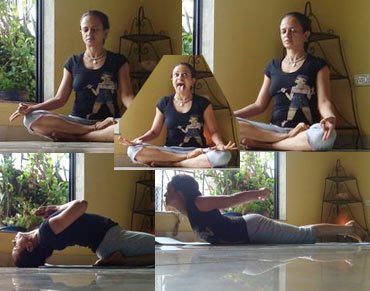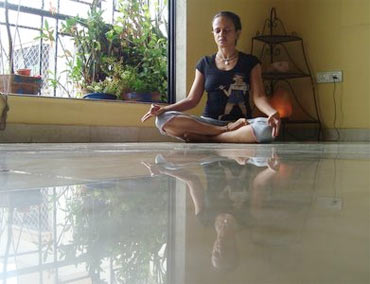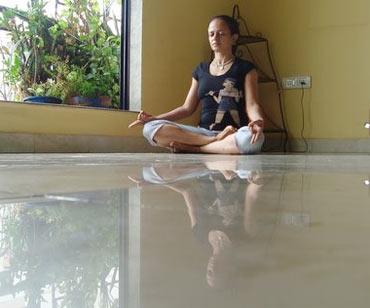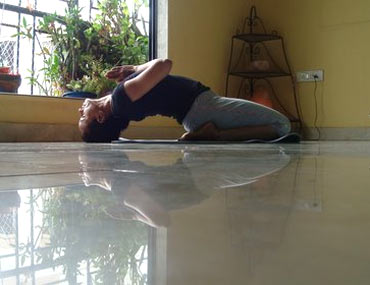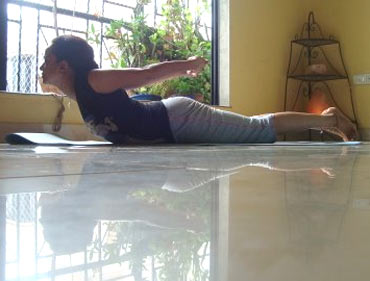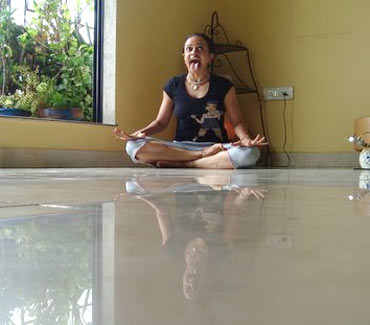 | « Back to article | Print this article |
Managing the monsoon, through yoga
Shameem Akthar, yoga acharya trained with the Sivananda Yoga Vedanta Center, will take you through five practices that will see through this monsoon.
Monsoon invites health problems like honey attracts bees: sniffling cold, fevers, respiratory ailments, congestion, physical lethargy that makes any activity, including otherwise pleasurable ones, difficult.
It is also the season when the body piles up toxins due to the physical lethargy it invites and the hunger it encourages in the body's bid to pile on some fat to protect it against the cold!
Add to this digestive disasters linked to water which has become polluted (due to seepage, inevitable in a sprawling city like Mumbai) and food stuff that rots faster due to high humidity levels.
It is also the season for mosquitoes which spread a host of diseases, even as conditions turn ideal for bacteria and virus to flourish. Both have increasingly becoming resistant to modern-day drugs.
All of which point to the fact that the only way we can survive the season is through boosting our immunity. Having a half hour yoga programme daily can ensure this. The programme should include surya namaskars, two pranayamas, and a set of asanas, with the final shavasana or corpse pose.
Surya namaskar (Sun salutes) are famous for boosting immunity since the poses activate the thymus gland, at the chest, involved with immunity. The sequence also clears the lympthatic pile-up in the body, works on all the major glands.
Pranayamas like kapalabhati (skull-cleanser) and bhastrika (bellows breathing) are warming practices that also boost immunity and prevent and control congestion. An ideal practice during monsoon should include most chest-opening practices, since this will work on the thymus. Chest opners are also intensely stimulating; they shoo away the sense of dullness and lethargy common to this period.
Shameem Akthar, yoga acharya trained with the Sivananda Yoga Vedanta Center, will take you through five practices that will see through this monsoon.
For more of Shameem's yoga writings visit http://jaisivananda.blogspot.com. Follow Shameem's yoga products on her online shop Yogatique on Rediff Shopping here.
Disclaimer: This column just shares the columnist's passion for yoga which is ideally learned under the guidance of an expert.
Pitta Kaarak Mudra (Metabolic fire rousing hand gesture)
To do this mudra sit still in any meditative pose. Shut your eyes. You can also do it seated in chair. Press down little finger and the ring finger. Press down thumb on both bent fingers. Do for each hand. Hold for five minutes or so. Do thrice during the day in chronic cases.
Avoid: If having excess pitta dosha or fire element in your body. This can be ascertained by an ayurvedic expert. Also, avoid when suffering from inflammatory conditions, like ulcers, acidity.
Benefits: It suppresses the water and the earth elements in your body. This in turn spikes the fire element. The fire element is concerned with physical stimulation, and increases inner heat, metabolism, digestion.
Best time, therefore, is when the pitta element flows, which is around 10 am to 2 pm.
Kapalabhati (Skull cleansing breathing practice)
Sit straight in any meditative pose.
Inhale and exhale deeply, fast. Do the in-and-out routine five times for one round. Rest, breathing normally. Repeat two more rounds. Don't exert nostrils or face. The breath must be deep, drawn from abdomen. The number of pumpings/hyperventilation may be increased with regular practice to any where to 30 up to 60.
Avoid: In heart, BP problems, epilepsy.
Benefits: Kapalabhati's impacts breathing. Is therapeutic in depression, especially seasonal affective disorder common during wet or cold seasons. Boosts digestion and metabolism. Removes mental sluggishness.
Supta Vajrasana (Lying warrior pose)
Sit on your knees, so that your big toes are touching, heels are flared. Keep the knees close together. But if a new comer to the pose you can keep the knees apart. If new comer to the pose, also place a bolster or large cushion where your head is likely to touch when you lie back.
Now prop your elbows, one at a time on the ground. Using elbow support, lower head, arching neck and upper back. Place crown on floor. Place hands at the chest, in namaste gesture.
Breath normally.
Bring knees together. Push chest up higher. Hold for six breaths. Release, to raise head back up, using elbows, one at a time, to prop yourself back to starting position. You may increase time in the pose with regular practice.
Avoid: If having knee problems or vertigo.
Benefits: The powerful stretch along the torso has a toning effect on the gut which is rejuvenated back to youthfulness and more efficient digestion, absorption and metabolism. It reduces fat by helping move food faster through the gut. Is extremely relaxing due to powerful complete body stretch it provides. Boosts immunity and breathing.
Sarpasana (Snake pose)
Lie on your stomach. Place hands on either side of shoulder, with chin on ground, legs close, lightly touching. Place hands behind, interlocking fingers.
Inhale, lifting chin off the ground, simultaneously lifting interlocked hands behind so that they are off the back. Ensure both hands are tautly stretched. Continue breathing, pushing your chest up to hold the pose as long as is possible.
Release with an exhalation, gently bringing chin back to ground, releasing hands back to ground, near either shoulder. Rest on your stomach, eyes shut, hands over each other, one cheek rested on the back of the hands, breathing normally (in the pose called makarasana or crocodile, discussed in earlier columns).
Benefits: Removes emotional blockages. Ups mood. Aids in respiratory ailments, powering the lungs. Heart and immune system are both impacted. Face becomes younger due to the powerful stretch from neck upwards. Spine enjoys a powerful traction.
Simhagarjasana (Lion-roaring pose)
This may be done seated or standing. Sit in any comfortable position, ideally vajrasana (thunderbolt pose). If the latter, you may spread out the knees and place hands between them, fingers pointed towards body, and hands under the thighs.
If standing bend forward lightly, bending legs at the knees and placing hands on the thighs, fingers spread out.
Inhale and exhale twice deeply. After the third inhalation, exhale forcefully, pushing tongue out and down, eyes looking upwards, the body taut as much as possible, stomach caved in and held firmly. Fingers should also become taut, if you are standing.
Hold the pose as for five seconds or counts. Release and repeat a few times. The number of times you do this and the duration in the final pose may be increased with practice.
Benefits: This is one of the most powerful therapeutic poses. Reduces fever and cold. Removes lethargy. Is anti-aging, removing tension lines and wrinkles from the face. It offers relief in halitosis.
